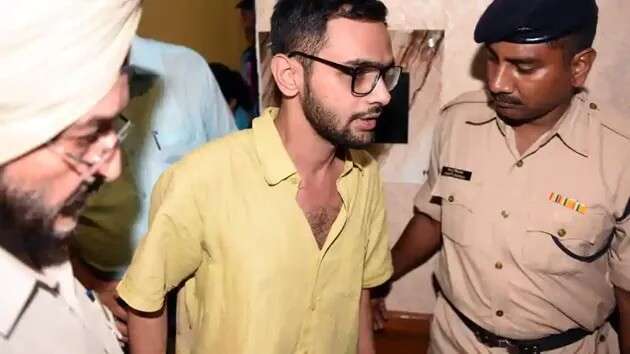Delhi High Court on October 18, 2022, observed that the protest planned by Umar Khalid and others against the CAA and NRC was a premeditated plan and would prima facie be covered by the definition of a terrorist act under the UAPA. The Court was listening to the bail plea of Khalid, who has been under arrest since September 13, 2020. The special division bench of justices Sidharth Mridul and Rajanish Bhatnagar while rejecting the bail application said, “We do not find any merits in the bail appeal, the bail appeal is dismissed”.
“Having carefully gone through the charge-sheet and taking into consideration the fact that the appellant was in constant touch with other co-accused persons, including Sharjeel Imam, who arguably is at the head of the conspiracy; at this stage, it is difficult to form an opinion that there are not reasonable grounds for believing that the accusation against the petitioner is prima facie not proved,” the bench said in its order. The Court observed that “Khalid’s presence throughout several WhatsApp groups during the period beginning from the passing of the Citizenship (Amendment) Bill in December 2019 till the February 2020 riots, had to be read in totality and not piecemeal”. Further, the Court said in its judgment:
The protest planned was ‘not a typical protest’ normal in political culture or democracy but one far more destructive and injurious geared towards extremely grave consequences…. The attack on police personnel by women protesters in front only followed by other ordinary people and engulfing the area into a riot is the epitome of such premeditated plan and as such the same would prima facie be covered by the definition of ‘terrorist act’.
The name of the appellant finds recurring mention from the beginning of the conspiracy till the culmination of the ensuing riots. Admittedly, he was a member of the WhatsApp group of Muslim students of JNU. He participated in various meetings at Jantar Mantar, Jangpura Office, Shaheen Bagh, Seelampur, Jaffrabad and Indian Social Institute on various dates. He was a member of the DPSG group.
The Court added:
He (Khalid) referred to the visit of the President of USA to India in his Amrawati speech. The CDR (call detail records) analysis depicts that there had been a flurry of calls that happened post riots amongst the appellant and other co-accused. The cumulative statement of the protected witnesses indicates the presence and active involvement of the appellant in the protests, engineered against the CAA/NRC.
Admittedly these protests metamorphosed into violent riots in February 2020, which began by firstly choking public roads, then violently and designedly attacking policemen and random members of the public, whereat firearms, acid bottles, stones etc. were used, resulting in the admitted and sad loss of 53 precious lives and the destruction of property worth several crores. These protests & riots prima facie seem to be orchestrated at the conspiratorial meetings held from December 2019.
“The Ld. Sr. Counsel (Khalid’s lawyer Trideep Pais) tried to explain the meaning & import of ‘Inquilabli Salam’ (revolutionary salute) and ‘Krantikari Istiqbal’ (revolutionary welcome) by submitting that these words were used for greeting everyone and inviting the spirit of revolution and that these words were used in his speech in the context of people standing against a discriminatory law and were protesting against it and by no stretch of imagination, the use of the words ‘inquilab’, ‘krantikari’, or revolution can be termed as a crime. It was also submitted that it was a call for an opposition to an unjust law and in any case the appellant did not call for violence….”, the judgment said.
It was further said that, “however, this court is not impressed by the argument of the appellant in as much as the call to revolution does not have to affect only the immediate gathering. The call to revolution may affect many beyond those who were visibly present, which is why this court finds it apt to mention Robespierre, who was at the vanguard of the French revolution”.
“This court is of the view that possibly if the appellant had referred to Maximilien Robespierre for what he meant by revolution, he must have also known what revolution meant for our freedom fighter & first Prime Minister. The very fact that Pandit Jawaharlal Nehru believed that democracy has made revolution superfluous after independence and how it meant the complete opposite of a bloodless change. Revolution by itself isn’t always bloodless, which is why it is contradistinctly used with the prefix — a ‘bloodless’ revolution”, the judgment said.
Khalid has been charged in the February 2020 anti-Hindu Delhi riots, under Sections 13, 16, 17, and 18 of the Unlawful Activities (Prevention) Act (UAPA), Sections 25 and 27 of the Arms Act, and Sections 3 and 4 of the Prevention of Damage to Public Property Act,1984.














